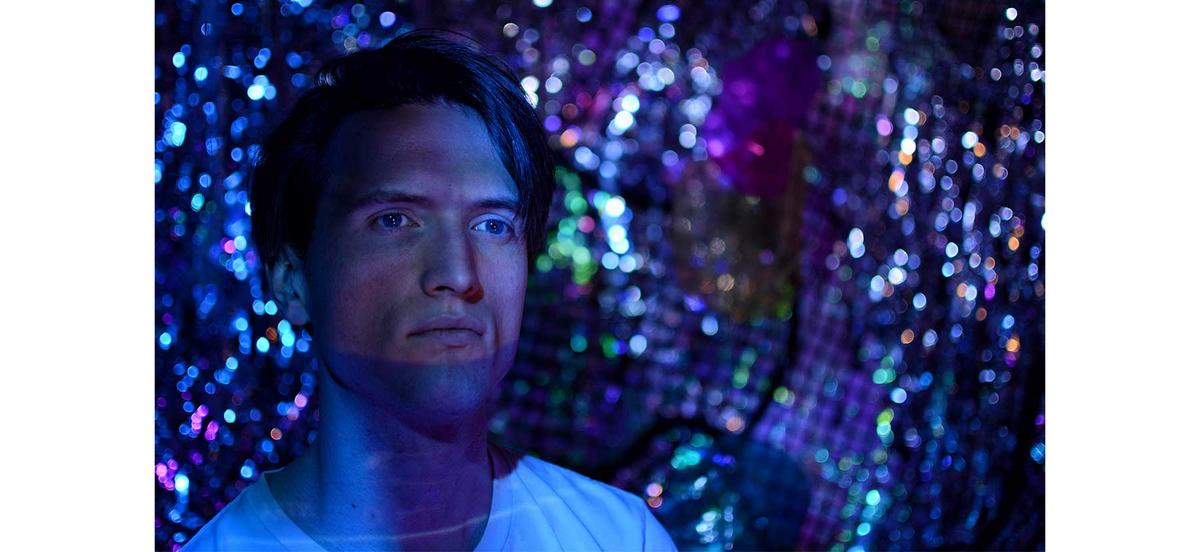Andrew Burke '14 Reaches Across Musical Genres

Andrew Burke ’14 is a classical music composer who has also released an EP of pop songs under the name Danke Shane.
Details
The alum's musical composition spans from pop to classical styles.
When composer Andrew Burke ’14 is writing a piece of music, he’s not necessarily starting with music in mind. “I’m interested in taking a non-musical topic and finding ways to explore that topic with music,” he says. “The process of trying to use music to make sense of something forces you to look at things in a different light.”
It’s an approach that keeps Burke moving in multiple musical directions. He transferred to Haverford for his junior year to study music composition, and his thesis, “Who Speaks for the Gods?,” was a song cycle for piano and voice that took religious texts and examined how they could be twisted and weaponized by extremists. His body of work is not strictly classical in form or approach, and includes pop songs, film music, and more.
Three of Burke’s recent projects demonstrate his range: Early in the pandemic, he collaborated with a high-school friend on bossa nova-driven songs under the name Latitude Unknown, and in late 2021 he released Future Real Ones, an EP of home-recorded pop songs under the name Danke Shane. In April, he was on the Haverford campus to debut “Keepsake,” a classical piece commissioned by the College for the opening of the Michael Jaharis Recital Hall. Performed at the event by pianist Charles Abramovic, “Keepsake” was composed for solo prepared piano whose sound Burke altered by applying an adhesive putty to the strings.
Burke, 30, who earned a master of music degree at Johns Hopkins University’s Peabody Institute, recently relocated to Philadelphia for a Ph.D. program in composition at the University of Pennsylvania. He believes studying composition within the wider context of Haverford benefited his growth as a composer. “It’s important for musicians to be part of the larger world and not just off in their own bubble, nerding out over some Shostakovich piece,” he says. “I’m grateful I had the chance to have both the liberal arts and conservatory experience.”
The enforced isolation of the COVID-19 lock- downs, however, propelled Burke into another sort of bubble and forced him to shift away from classical work. “Composition really requires working with other performers, and the typical outlet is a live setting. When you write a piece for piano and violin, it will be given to musicians to perform in a recital hall,” he says. “Pop music is something you can write and record on your own, and then share with people.”
The Danke Shane EP is a pandemic-era pop project that grew out of experimental laptop recordings Burke did while at Haverford. He revived it when he found himself at home with his fiancée, Idun Klakegg ’15, and lots of free time. “Recording is a good project for when you’re stuck in your house and don’t have a lot of people around,” he says.
The six songs on Future Real Ones marry the compressed feel of bedroom pop with sophisticated sounds. Burke plays nearly all of the instruments and sings lyrics that are by turns lonely and searching. The EP’s first cut is “Even If,” which starts with the slowed-down sound of an unamplified electric guitar that speeds up as Burke sings in a sleepy voice, “When you wake up in the morning/Holding your breath for a moment/ She wants to know what you’re thinking/It’s not enough to just dream it.” Other tracks use dance- able beats, stacked harmonies, dense arrangements, and an overall feeling of isolation that’s in keeping with the music’s moment of creation.
The Covid lockdowns also opened up a space for Burke to compose the score for the feature-length film Brutal Season. The film, a drama set in 1948, premiered at the Austin, Texas, film festival Fantastic Fest in September.
With the world opening back up and his Ph.D. program starting, Burke is looking forward to integrating the paths he’s been on rather than keeping them in their own musical boxes. “For a long time, I thought the process of becoming a composer was honing in on one little niche and letting go of the side projects, but now I have more freedom to be multiple things at once,” he says. “Getting into music, becoming a composer, it can be a prismatic process where your interests refract outward in multiple directions at once.”



